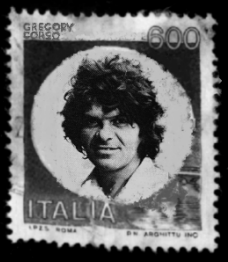So throw off your stupid cloak
Embrace all that you fear
For joy will conquer all despair
In my Blakean year
It's national poetry month. I don't expect all sentient beings to have Blakean visions or to scribble down poetic thoughts or to even read a poem. Most people are too busy. Most people lack the imagination, or the willingness to risk seeming foolish, to write a poem. Most people quake in their boots and stare at the ground and scratch and spit and think poetry is for gays and weak sisters, juvenelia written on PeeChees--or think that poetry is something off a Hallmark card or has to do with an old woman who once lived in Nantucket. Can't blame 'em. They're too busy to slow down and smell the poetry. They're too important to waste their valuable time communing with the Muse. If you could look into their hearts you would probably find that they're deathly afraid of those naked, unguarded moments of the unchained mind--that poetic state that comes unbidden at three in the morning. That state must be kept at bay, distracted, subdued, tricked into silence--and if they ever let up and stopped their internal, sub-vocal peptalk for even a moment what angels or demons would they be inviting to slowdance?
Most men, said Thoreau, lead quiet lives of desperation and go to the grave with the song still in them. How sad, and how boring. No guts no glory. As if in retort, Jack Kerouac, in his overquoted phrase, would utter "The only people for me are the mad ones, the ones who are mad to live, mad to talk, mad to be saved, desirous of everything at the same time, the ones who never yawn or say a commonplace thing, but burn, burn, burn..." and so on. And then he drank himself into a stupor and backed off from such a demanding proclamation he himself couldn't live up to. His rowdy days were over long before he buried his guns. He chickened out in the end.
A poem begins as a lump in the throat, a sense of wrong, a homesickness, a lovesickness. Robert Frost said that. It's as good as any description of what inspires the subversive act of poetry. What good are poems? No good whatsoever. If anyone tells you otherwise be suspicious. In the right hands, poems are about as useful as beach grass, as October light, as the midnight of the soul, as an unspoken truth, as tits on a bull.
Gide, the thief, once said, "Please do not understand me too quickly."

My father took me back home, back to Greenwich Village, and he thought by taking me out of the orphanage he'd be out of the World War too. But no way - they got him anyway. He went in the Navy and then I lived on the streets.
Anyway, I lived on the streets and did pretty good until I got caught stealing, what was it? I kicked in a restaurant window, went in and took all the food that I wanted, and while coming out I was grabbed. I remember the people I knew in prison; I was very fortunate to know them - they came from 1910, 1920, 1930. I was what? - twelve years old - and I was thrown in the cells with these people, so I learned fast. The lucky thing was that I was Italian; when the other Italians saw me fight back, they came to my defense.
They, that unnamed "they," they've knocked me down but I got up. I always get up-and I swear when I went down quite often I took the fall; nothing moves a mountain but itself. They, I've long ago named them me.
--quotes from Gregory Corso, American poet (March 26, 1930 – January 17, 2001)
No comments:
Post a Comment